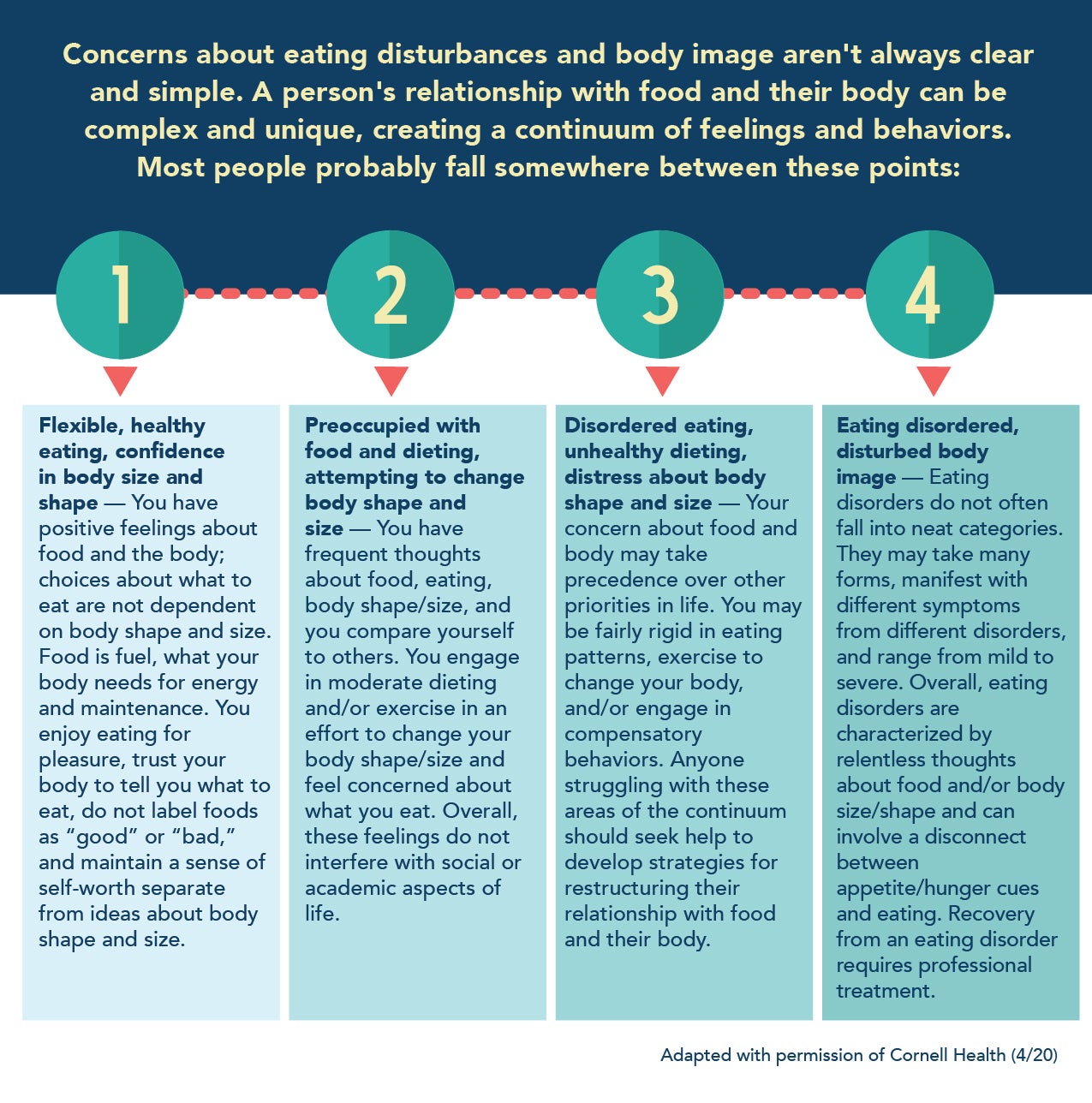The Definitive Guide to Eating Disorder Recovery
Table of ContentsThe Of Eating Disorder Recovery8 Easy Facts About Eating Disorder Recovery ShownIndicators on Eating Disorder Recovery You Should KnowEating Disorder Recovery for Dummies
Repeated as well as combined behaviours like these might be an indication of an eating condition as well as ought to be kept an eye on. A person's mood and also how it is shown or revealed (impact) can supply some further insight right into the probability that they are experiencing an eating problem. Signs to watch out for consist of: social withdrawal or isolation; rapid changes in mood; raised stress and anxiety; and/or high degrees of control or obsessionality (which may or might not be connected to food or the body).As an example, a person can be upset even if their outside behavior does not match what they feel (eating disorder recovery). While this might be the situation for everyone periodically, this incongruence may be much more obvious in individuals with consuming conditions. Changes in social behavior such as someone that was previously social starting to stay clear of going out with various other people may be specifically telling if the pattern reaches most or every one of the person's social assistances, and if there is little else that would certainly better clarify the change.
Likewise, these lists are not extensive, yet are intended to offer you with domains for factor to consider. Discovering a few of the signs may not be a cause for problem. It's when these changes begin to become upsetting or disruptive to the private or to individuals around them that closer interest need to be paid.
You could be not sure concerning when as well as where to begin or what to claim. These feelings are vital and can develop component of the conversation you have.
Eating Disorder Recovery Can Be Fun For Anyone
Your key objective, for instance, may be to just 'sign in' with your loved one to see if there is anything you can do to sustain them typically. Relying on the direction of discussion, you might then be able to express issue regarding recent changes in behaviors or mindsets, including those pertaining to food.
Keep in mind that these conversations take time, might require to be had numerous times, as well as may not constantly have a clear end result. This is flawlessly alright; it is essential to maintain your own expectations realistic. Remember the complying with factors to help you promote the discussion: Usage non-judgmental and also non-blaming language.
The truth that you are ready to use support if they want it can be helpful for them to recognize, currently or in the future. Attempt to prevent believing as if the individual is the eating condition.
Simply as a health problem such as cancer does not define who somebody is, an eating disorder needs to not be seen by doing this either. Delicately encourage care. Try to obtain the person to their family doctor or one more qualified health expert (such as a professional you can try these out psychologist) for an analysis. If you pick up resistance, as well as if the person is not seriously unwell, be client and also persistent.
Excitement About Eating Disorder Recovery
Do not attempt to provide a simple remedy. Examples of what not to say consist of 'Just eat, you'll feel better' and 'Simply don't fret about your body.' Individuals with an eating condition do fight with eating and also do feel terribly about their body, however the point is to obtain them the help they need to recover, which isn't as easy as suggesting that their thinking or practices is wrong.
Blaming on your own for someone's eating condition or condemning that person is purposeless to everybody. Stick to routines and also regulations for all members of a family, rather than singling out the person who might have an eating problem.
Look for specialist aid. The very best time to look for expert assistance is as quickly as you understand or think something is wrong. You can start by chatting with a basic specialist, paediatrician or other health expert you rely on to find out more regarding consuming disorders, obtain their point of view, or create a strategy for exactly how to help obtain your liked one to see an expert.

8 Easy Facts About Eating Disorder Recovery Explained

Bear in mind that, while the course in advance of you can sometimes feel isolating, you are not the only one in navigating this obstacle. Like your liked one, you also are learning concerning taking care of the possibility of an eating condition. Take a moment when you can to breathe, procedure and emphasis on establishing one foot before the other.
We all require to consume, and a lot of us expect consuming. Greater than beneficial our bodies, food is often a huge part of obtaining with each other with individuals we enjoy. It's difficult to envision what life would certainly be like without the several social occasions we have actually built around sharing food.
Left unattended, eating conditions can cause major consequences like organ failureor even death. There are several types of consuming disorders, as well as some individuals might experience symptoms of even more than one disorder. The most common consuming disorders are: A condition identified by purposeful efforts to severely restrict food consumption (in spite of low body weight), commonly to the point of professional malnourishment.